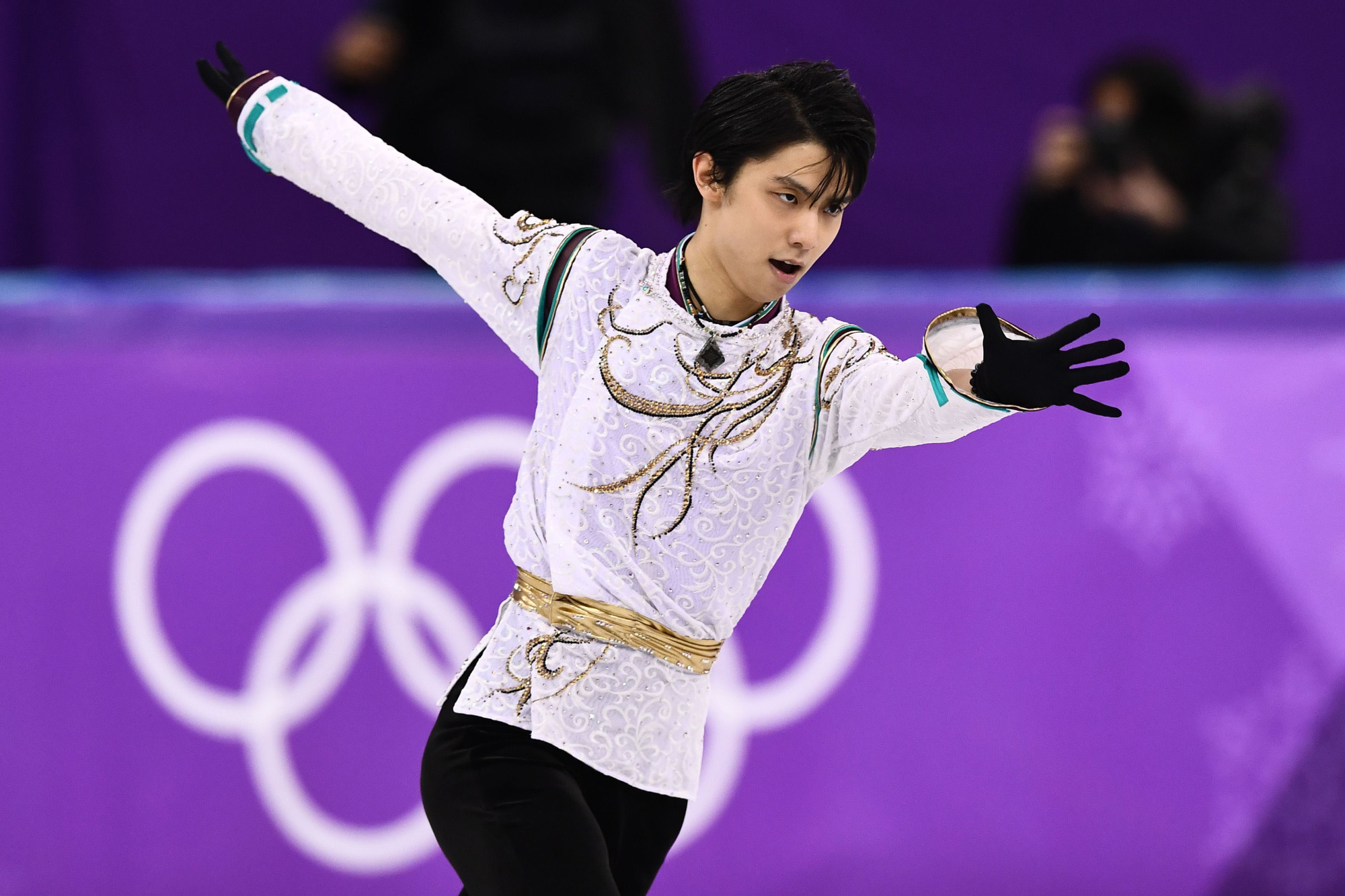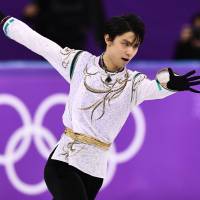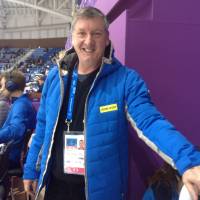It's not often that you get to chat with a legend in skating.
But two in one day?
Well, that is remarkable in itself.
Ice Time spoke to two Olympic champions — American Scott Hamilton (1984) and Britain's Robin Cousins (1980) — at Gangneung Ice Arena this week, in the wake of Yuzuru Hanyu winning his second Olympic gold medal, to get their takes on the young superstar.
Both Hamilton and Cousins are here commentating on the skating events. Hamilton for NBC, and Cousins for BBC.
They discussed Hanyu's incredible performance, what he means to the sport, and the passion of Japanese skating fans in insightful and compelling detail.
Hamilton, a four-time world champion (1981-84), talked about Hanyu's uniqueness as a skater.
"We saw in Sochi how remarkable of an athlete he is," Hamilton stated. "The way that he presents himself through his programs and his artistry as being very organic and genuine to who he is as a skater.
"As a young skater you wonder how he is going to grow within the sport," Hamilton continued. "He won a world championship after that Olympic gold medal, then didn't win for two years, and he came back and won last year.
"The question marks were, is he going to be able to keep up with the explosion of quads? Because once you win it's really hard to apply new spots. You are who you are. A leopard can't change his spots. But he grew and added more jumps to his arsenal. He is still young enough to do that."
Hamilton, who is 59 now, then addressed Hanyu's challenge in coming back from the right ankle injury.
"For him to get injured like he was on the quad lutz in the fall, the question mark was, 'Will he be able to put down a program?'
"To skate the short program as he did, that's the key," Hamilton noted. "You can't take yourself out of the competition. You have to be right there.
"He won the short and then it came down to making sure he bested the two other guys right behind him. He was able to do that, regardless of what Nathan Chen did."
Incredible athleticism
Hamilton, who was born in Bowling Green, Ohio, spoke of Hanyu's athleticism and his drawing power.
"Hanyu is an extraordinary athlete," Hamilton commented. "He's got this amazing fan following. It's unbelievable. I mean he filled this arena.
"The Japanese audience loves figure skating and I'm really amazed as how they went crazy for him, they went crazy for (Javier) Fernandez, and they went crazy for Chen, and they went crazy for Shoma (Uno). It shows they love their champions, but they also just love great skaters."
When I asked Hamilton if he was aware that he and Hanyu were the last two skaters to win the Olympic gold that didn't win the free skate, he had a classic reply.
"No. I wasn't aware of that. But you know what. We both deserved it.," Hamilton said with a laugh.
Hanyu's remarkable poise
Cousins, a three-time world medalist (1978-80), believes Hanyu creates challenges that he must rise up to meet.
"Coping with the pressure. It's amazing," Cousins stated. "We know from watching interviews, he put the pressure on himself. I saw an interview where he said, 'People say I know don't have to do what everyone else does, but I want to.'
"That's the kind of person that becomes a star and a champion, and a very unique and special Olympian. Which is what he is," Cousins commented. "Two-time Olympic gold medalist. He has set a new benchmark."
Cousins, the 1980 European champion, then spoke of how there is a lot more to Hanyu's game than quadruple jumps.
"What I love about him is, could he still be a champion without the quads?" Cousins said. "Absolutely."
Cousins, who turned 60 last summer, addressed the explosion of quads currently rocking the sport.
"My thing with skating nowadays is that it is so quad-centric," Cousins noted. "Everything is about the jump, jump, jump. I look at all performances. If you took the big tricks out, whether it's pairs, singles or dance, would you still want to watch?
"Would the person still be interesting? Cousins wondered. "Do they still have something to say?"
Cousins feels Hanyu's training partner Javier Fernandez, the bronze medalist here, also has that special something in addition to jumping ability.
"With Javi you have it and with Hanyu you have it. Absolutely," Cousins stated. "Two completely contrasting styles, very much similar to what we've seen in the ice dancing with the French and the Canadians. But that's what makes our sport so great."
Cousins, a native of Bristol, England, doesn't believe the current rules have totally quashed individuality.
"As much as people say, 'Well, it makes everybody doing the same thing now. Everybody is ticking the same boxes," Cousins commented. "They might be doing the same thing, but certainly don't look the same.
"It is great, and I think he (Hanyu) is a phenomenal champion. He is absolutely a rule-breaker for our sport."
One of the all-time legends
Cousins then harkened back to his time in the spotlight on the world stage and said Hanyu belongs with the all-time greats.
"I go back to my day, and the people who I looked up to, and you look at the transitions between superstars of figure skating," Cousins stated, "and he is absolutely a superstar of figure skating in my world."
Cousins acknowledged that the elements he is seeing today were not even imaginable back in his heyday.
"I sit there with my jaw on the floor watching these guys jumping and doing things that were science fiction in my day. I mean it was science fiction," Cousins claimed. "If somebody had said, 'There are going to be five quads,' it would have been ha, ha, ha.
“We saw triple axels, and I could do triple axels. You might have saw a quad, but it wouldn’t be that pretty,” Cousins said.” But now you have 14-year-old girls doing them. You kind of go, ‘Wow. What is it?’ ”
Cousins wonders if it has all gone too far, but thinks that Hanyu program components are so special that he can win where others can't.
"At some point, the insanity does have to stop," Cousins commented. "But then you look at Hanyu, and you go, 'But actually you don't need them all.'
"You have something else. There is something. He is almost an ethereal being in the way he skates. It's interesting, because he is not that accessible when he performs."
Singular focus on the ice
Cousins thinks that Hanyu is in his own world when he is competing on the ice.
"Javi was like me. I wanted to skate for the crowd," Cousins stated. "I wanted to know exactly how many people were watching me.
"There are other skaters, and I don't know him that well, but I would say that Hanyu is that person who doesn't need to know who's in the audience," Cousins continued. "He needs to know what he wants and he makes them come to him. It's a different dynamic, but it absolutely is mesmerizing.
Before the men's singles began here, two-time Olympic champion Dick Button, one of the giants of the sport, sent out an interesting tweet.
"I urge you to look up performances by John Curry, Toller Cranston, Robin Cousins," Button wrote. "All were different, all interesting, all innovative. Compare with the similarity of today's skaters who have to abide by current rules. Remember it's a Quad Fest."
Button, at 88, still casts a huge shadow over the sport. When he talks (or tweets), people take notice.
Cousins smiled when informed of Button's tweet and was clearly moved.
"Whoa. That is phenomenal. That is fantastic," Cousins replied. "I do hope that anybody coming through who is a fan of Hanyu, who is a fan of Fernandez, also knows who people like Toller Cranston and John Curry and myself are.
"I said this in an interview the other day: 'You need to be reverent and you need to know your history in order to move your personal story forward. Know who you are no matter what it is — sports, theater — no matter what it is, you need to know what came before you."
Cousins then talked about the passing of the torch from one generation to the next in skating.
"Because without Dick Button doing what he did, the likes of the Jenkins brothers (Americans David and Hayes — both Olympic gold medalists), then you go to Toller and John doing what they did," Cousins said. "They gave me permission to be me.
"People like myself, Scott Hamilton, Brian Orser, Brian Boitano then gave the permission to the Fatievs and to the Kuliks. It's moved along.
"Then you have Verne Taylor doing the first triple axel," Cousins added. "You have Kurt Browning, who was probably the greatest Olympic champion who never had an Olympic title."
Advice for young skaters
Cousins then dispensed some friendly advice to the young skaters coming up today.
"These people all had reverence to know where they came from, and that is the only thing I ask anybody coming through now," Cousins stated. "The one thing we never had was Google and YouTube. It is your best friend. Use it and learn from it."
Cousins concluded by citing the fervor of Japanese fans for skating.
"The fans there are skating fans," Cousins said. "They are loyal and they are true, and we have seen that for as long as I have been involved in it.
"It has gone to another level now with Hanyu. But so has Japanese skating as a whole and Asian skating. It is fantastic. A testament to the skaters themselves."
Cousins seemed awed by how Japanese skating fans will travel the globe to support their skaters.
"It's all very well to do your job out here (on the ice), but they must be doing something collectively that keeps these audiences coming back and traveling all around the world for them," Cousins commented.
"I still get letters from Japanese fans, and people say, 'We saw you in the commentary box.' It's lovely, because they were loyal and to the end," Cousins said. "If you were a great skater, that's what they loved ultimately. Because they are skating fans."
Cousins feels that Japanese skating fans are ardent for good reasons.
"I am not surprised, and it's well-deserved," Cousins stated. "At the top they have some of the best."




















With your current subscription plan you can comment on stories. However, before writing your first comment, please create a display name in the Profile section of your subscriber account page.